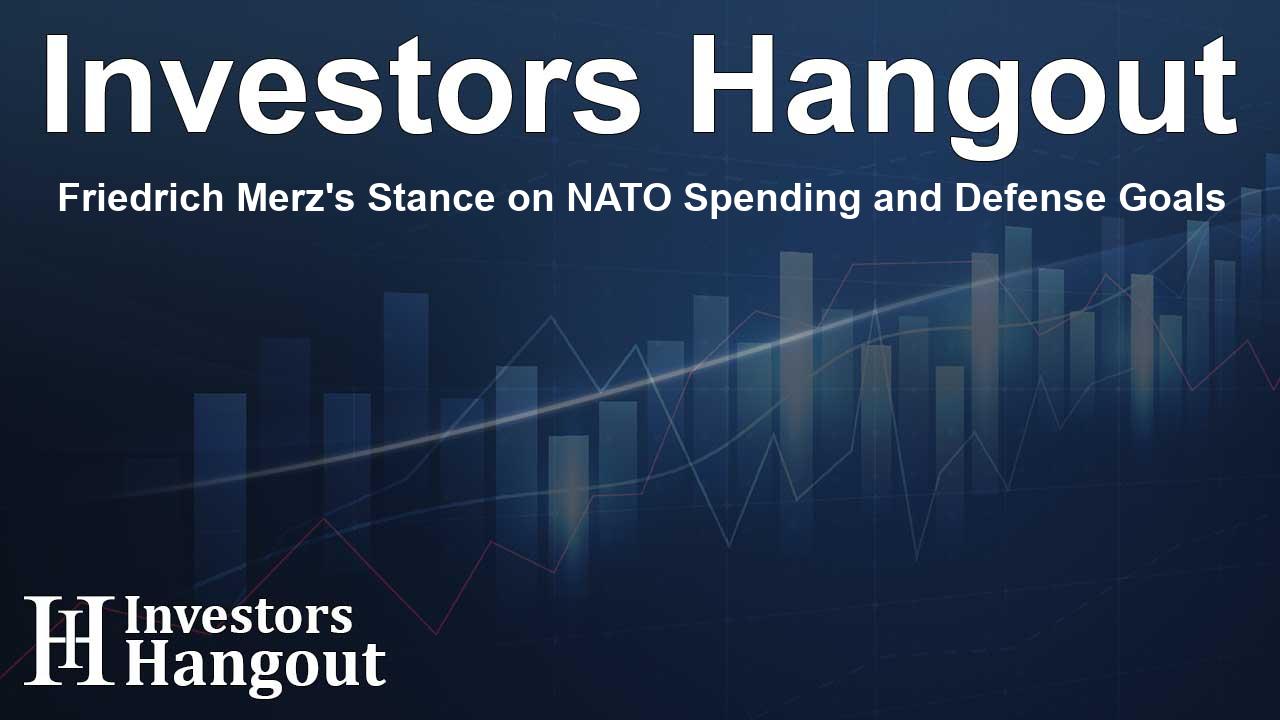Friedrich Merz's Stance on NATO Spending and Defense Goals

Friedrich Merz Shares His Views on NATO Spending Goals
In the current climate of global security concerns, German opposition leader Friedrich Merz has faced questions about his commitment to NATO's defense spending goals. As the leading candidate for chancellor in the upcoming parliamentary elections, his stance is critical for both national and international observers.
Germany's Defense Spending Debate
Merz has acknowledged the necessity for Germany to increase its defense budget but has refrained from committing to specific NATO spending targets, especially the ambitious figures put forth by U.S. President-elect Donald Trump. In a recent interview, Merz stated, "We first really have to reach the 2% lower limit in Germany. We are not there yet." This recognition highlights the current state of Germany's defense investments, which still fall short of NATO's guidelines.
Understanding NATO's Spending Expectations
The NATO alliance has an overarching goal for its member states to reach a defense spending benchmark of 2% of GDP by 2024. However, the push from Trump for increased contributions has caused divisions among member nations. During his campaign, Trump suggested that NATO members should aim even higher, at 5% of GDP, further complicating the discussions surrounding defense budgets.
Key Figures Weigh In on Defense Investments
Echoing Merz's cautious optimism, Markus Soeder, the leader of the Christian Social Union (CSU), emphasized the need for a significant increase in military spending, suggesting it should exceed 3%. His remarks underline a growing sentiment among German conservatives to bolster the country's defense capabilities in response to rising geopolitical tensions, particularly from Russia.
The Future of Germany's Defense Budget
A critical concern looms over Germany's ability to sustain its defense spending at the NATO target level. Currently, Germany relies on a special fund to meet the 2% requirement. However, there are doubts about its viability beyond the year 2028, when the fund is expected to be exhausted. This uncertainty raises questions about the long-term financial planning necessary for maintaining military readiness.
The Political Landscape Ahead of Elections
With parliamentary elections scheduled, defense spending has emerged as a pivotal issue in the political discourse. The intensity of pressure from not only U.S. leaders but also from an assertive Russia has catalyzed discussions on how Germany approaches its military budget. Merz's claims that future increases can occur without the aid of special funding have sparked debates among political rivals.
Differing Perspectives within German Politics
While Merz promotes a pragmatic approach, German Economy Minister Robert Habeck, representing the Greens, has called for a higher target of 3.5%. He argues that achieving such a level would necessitate financing through loans, a concept that has met with skepticism from some lawmakers. Dirk Wiese, deputy leader of the parliamentary group of Scholz's Social Democrats, criticized both Trump’s demands and Habeck's financing suggestions as misguided, signaling the complexity of the unfolding debate.
Conclusion: The Path Forward for Germany's Defense
The path forward for Germany's defense policy remains a topic of intense scrutiny as the nation approaches a critical juncture in its political landscape. The decisions made by leaders like Friedrich Merz will shape not just Germany’s role within NATO but also its broader defense strategy in a rapidly changing world. The outcome of the elections will likely play a significant role in determining the future direction of Germany's military expenditures and commitments.
Frequently Asked Questions
What is Friedrich Merz's position on NATO spending?
Friedrich Merz acknowledges the need for increased defense spending but does not commit to specific NATO spending targets advocated by U.S. leaders.
What are NATO's defense spending goals?
NATO aims for member countries to spend 2% of their GDP on defense by 2024, with President-elect Trump suggesting even higher spending levels.
How does Germany currently meet NATO's spending requirements?
Germany currently utilizes a special fund to meet the 2% spending target, but there are concerns about its sustainability beyond 2028.
What is the opinion of other German leaders on defense spending?
Other German leaders, such as Markus Soeder and Robert Habeck, have voiced opinions supporting significant increases in defense spending, each with differing proposed targets.
Why is defense spending a significant issue in German elections?
With rising global tensions, especially from Russia, defense spending has become a critical topic influencing voter opinions and political strategies in the impending elections.
About Investors Hangout
Investors Hangout is a leading online stock forum for financial discussion and learning, offering a wide range of free tools and resources. It draws in traders of all levels, who exchange market knowledge, investigate trading tactics, and keep an eye on industry developments in real time. Featuring financial articles, stock message boards, quotes, charts, company profiles, and live news updates. Through cooperative learning and a wealth of informational resources, it helps users from novices creating their first portfolios to experts honing their techniques. Join Investors Hangout today: https://investorshangout.com/
Disclaimer: The content of this article is solely for general informational purposes only; it does not represent legal, financial, or investment advice. Investors Hangout does not offer financial advice; the author is not a licensed financial advisor. Consult a qualified advisor before making any financial or investment decisions based on this article. The author's interpretation of publicly available data shapes the opinions presented here; as a result, they should not be taken as advice to purchase, sell, or hold any securities mentioned or any other investments. The author does not guarantee the accuracy, completeness, or timeliness of any material, providing it "as is." Information and market conditions may change; past performance is not indicative of future outcomes. If any of the material offered here is inaccurate, please contact us for corrections.